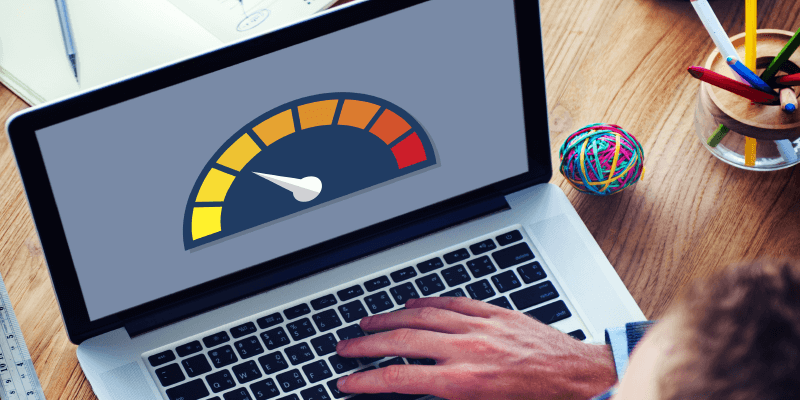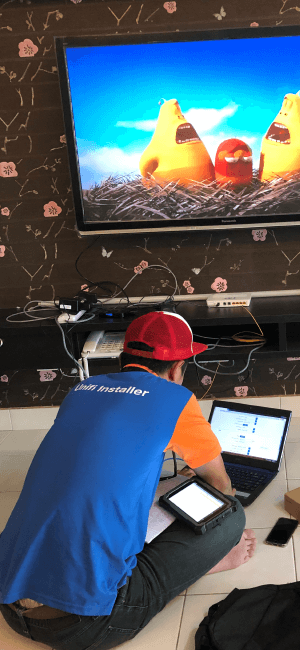How to check your internet speed with a home internet speed test

Matthew Harrington

Did you know that it's free, easy and important to test the speed of your internet? More than just telling you how fast is your internet, you can find out if you're getting what you're paying for.
In this article, we're looking at how to test your internet connection, how to interpret the results (like the upload and download speeds) as well as what to do when the speed is lower than expected.
Why is internet speed important?
Your internet speed is essential for a number of reasons. A slow connection can cause delays and frustration when you're trying to work, stream movies or TV shows, or play online games. Testing your speed with a home internet speed test can help you determine whether your connection is as fast as it should be.
Home internet speed tests are easy to use and can give you a good idea of your connection speed. However, it's important to keep in mind that the results of a home internet speed test may not be 100% accurate. The speed of your connection may vary depending on the time of day or the type of activity you're doing online.
What does an internet speed test measure?
Internet speed tests measure the speed of your connection, which is the speed at which data travels from your computer to the internet. The speed of your connection is measured in Mbps (megabits per second). This is the speed of your connection, and it will give you a good idea of how fast your internet is.
What factors can affect my home internet speed?
There are a number of factors that can affect your speed, including:
- The type of internet connection you have.
- The distance between your computer and the server.
- The speed of your computer.
- The number of devices connected to your network.
- The type of activity you're doing online.

How to test your internet speed at home
There are a few different ways to test your speed at home. One way is to use a speed test website, such as speedtest.net or fast.com. Simply visit the website and click on the "Start Test" button. The speed test will take a few seconds to complete and will give you an accurate idea of your connection speed.
Another way to test your speed is to download a speed testing app on your smartphone or tablet. There are many different apps available, but we recommend using Speedtest by Ookla, which is available for free on both iOS and Android devices. Simply open the app and tap on the "Begin Test" button to get started.
Once the speed test is complete, you'll be given your results in Mbps (megabits per second). This is the speed of your connection, and it will give you a good idea of how fast your internet is.
Other free internet speed tests: Run a speed test online
In addition to speedtest.net and fast.com, there are a number of other websites that offer speed tests. Here are a few of our favorites:
- speedof.me
- testmy.net
- dslreports.com/speedtest
- broadbandnow.com/Speed-Test
Here are some guidelines for interpreting your results:
- 0-5 Mbps: This speed is sufficient for basic web browsing and email.
- 5-10 Mbps: This speed is good for streaming video and music.
- 10-20 Mbps: This speed is great for HD streaming and online gaming.
- 20+ Mbps: This speed is ideal for 4K streaming and online gaming.
Keep in mind that these are just guidelines, and your speed may vary depending on the time of day or the type of activity you're doing online.
Wi-Fi speed: How to test internet speed of a wireless connection
If you're using a wireless connection, there are a few additional things you can do to test your speed.
First, try moving your router to a different location. This can help improve your signal strength and speed.
Second, try connecting your device directly to the router with an Ethernet cable. This will bypass any potential Wi-Fi issues and give you a more accurate speed reading.
Third, check for interference from other devices or appliances. If there are any devices in your home that emit electromagnetic fields (such as microwaves or cordless phones), they can interfere with your Wi-Fi signal and cause speed issues.
Fourth, make sure that your router is running the latest firmware. Firmware is the software that controls your router, and it can be updated periodically to improve performance and security.
Finally, if you're still having speed issues, you may need to upgrade your router or switch to a different type of Wi-Fi (such as 5GHz).

Latency, ping, download and upload speeds: What else you can learn from your speed test results
A speed test will tell you your connection's download and upload speeds. Download speed refers to the speed at which data travels from the server to your computer. Upload speed refers to how fast data travels from your computer to the server.
Both download and upload speeds are measured in Mbps (megabits per second). The higher the number, the better. A high download speed means that your connection is fast, and a high upload speed means that your connection is responsive.
In addition to speed, you can also learn about your connection's latency and ping. Latency is the time it takes for data to travel from your computer to the server and back again. Ping is the time it takes for a data packet to travel from your computer to the server and back again.
Both latency and ping are measured in milliseconds (ms). The lower the number, the better. Low latency means that your connection is fast, and a low ping means that your connection is responsive.
What is a good internet speed?
The speed of your connection will depend on a number of factors, including the type of internet you have and the activities you're doing online.
In general, however, a speed of 10Mbps or higher should be enough for most activities, such as browsing the web, streaming video and music, and gaming.
If you're planning on doing more intensive activities, such as 4K video streaming or online gaming with multiple players, you'll want a speed of 25Mbps or higher.
What can a slow connection cause?
A slow connection can cause a number of problems, including:
- Delays when trying to load websites
- Poor quality streaming video and audio
- Games that take longer to load or are choppy
- Difficulty connecting to video calls or online meetings
- Unable to use apps on your computer if they require a certain data speed
How to improve your speed: What to do when your speed is slower than expected
There are multiple ways to troubleshoot:
- Check your speed. The first step is to run a speed test and see what speeds you're actually getting. If your speed is lower than you expect, there may be an issue with your connection. Run a speed test a few times, on different devices and at different times of the day to make sure you're getting an accurate result.
- Check for outages. If there's an outage in your area, that could be the reason for your slow speed. You can check for outages on your ISP's website or by calling customer service.
-Connect to an ethernet cable. By connecting to your computer directly, you'll get a faster and more reliable connection.
- Restart your router. If you're still having trouble, try restarting your router. This will often fix any small issues with your connection. Also, check your modem for any issues.
- Check for interference. If you're using a wireless connection, there may be interference from other devices that are using the same frequency. If you suspect this is the case, try moving your router to a different location.
- Check your computer. If you're still having trouble, there may be an issue with your computer. Try restarting your computer and see if that helps.
-Contact your internet service provider (ISP). You can ask if they offer any speed upgrades. Many ISPs offer higher-speed packages for an additional monthly fee.
-Find a new internet provider. Sometimes the problem lies with how fast your internet is, not with the speed of your internet connection.
Find a new internet plan with HomeLinkd
Now you know how fast your internet connection is and how easy it is to check the speed. If you're happy with the results and how fast your internet connects, we're happy this article helped you! If you're not, it might be time to reconsider your ISP.
While internet speeds vary depending on the device, time of day and other factors, there's no excuse for consistent slow internet. In this article, we shared how the type of connection might affect your speed, how to troubleshoot both a wired and wireless connection and what to do to achieve faster internet speeds.
Running the test is the first step in making sure you're getting the best solution for your home. If you're looking for faster kinds of internet, HomeLinkd is here to help.
We have all the important on what to look for in a home internet connection. From cable internet to broadband, satellite internet and fiber, visit our website to learn more about your home network options.










